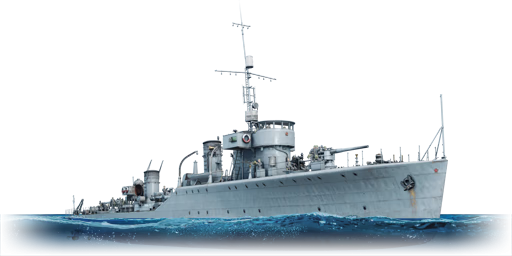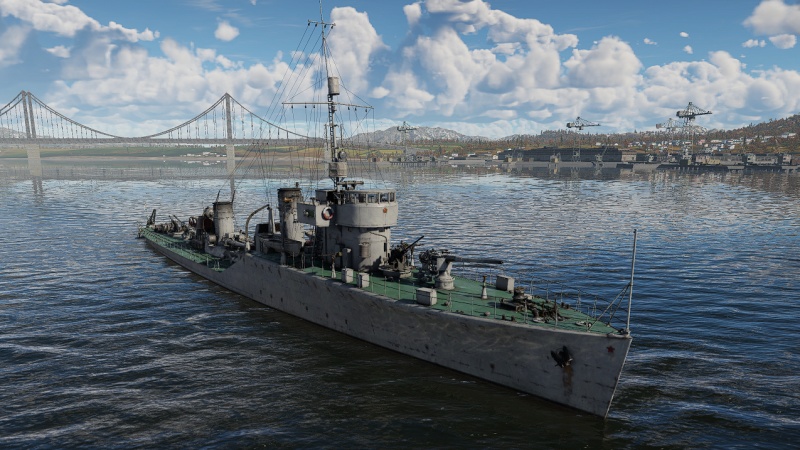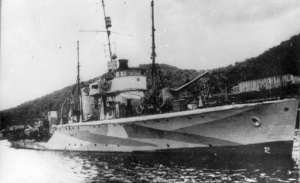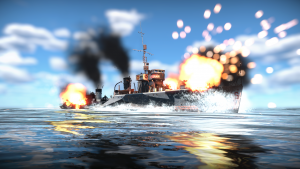Difference between revisions of "Groza"
(Updated format) |
(I added the whole page for the vessel.) (Tag: Visual edit) |
||
| Line 11: | Line 11: | ||
=== Survivability and armour === | === Survivability and armour === | ||
{{Specs-Fleet-Armour}} | {{Specs-Fleet-Armour}} | ||
| − | + | The Groza is a mixed bag for survivability. While she sports a larger crew than PT boats and more compartments to mitigate incoming damage, she has very little armor and none on her hull. Any larger-caliber cannons, such as those found on other gunboats and the early destroyers Groza can face, will easily shred her internal compartments and knock out components. The engines are harder to knock out, however, since they were placed inside the hull on a staggered basis with alternating boiler and engine rooms in pairs. This setup makes it harder for one round to knock out both of her power plants, meaning the Groza usually survives heavy damage with at least partial propulsion remaining. Her crew numbers 114, but many are above deck manning her weapons and are easily whittled down by incoming rounds and any fires that may break out. | |
=== Mobility === | === Mobility === | ||
{{Specs-Fleet-Mobility}} | {{Specs-Fleet-Mobility}} | ||
| − | + | The mobility of the Groza leaves much to be desired. She can only manage 21 knots forward and 10 knots in reverse, and the vessel’s turn time and rudder shift are very average. The Groza is powered by two three-drum water tube boilers, each driving one propeller shaft. The Groza will never be the first vessel to the battlefield or a capture point but still leaves some of the heavier armored gunboats in the dust. | |
=== Modifications and economy === | === Modifications and economy === | ||
| Line 26: | Line 26: | ||
{{main|Pattern 1911 (102 mm)}} | {{main|Pattern 1911 (102 mm)}} | ||
| − | + | The Groza is host to a powerful primary armament: two [[Pattern 1911 (102 mm)]] naval guns, mounted fore and aft. These are the same weapons mounted on the destroyers Frunze and Kerch, and are among the best cannons to be found on a coastal vessel. They have decent ballistics and are hard-hitting, even against the US destroyers that are slathered with anti-fragmentation armor. Each has a 160-round ammo supply, which will last for quite a while even during constant combat. The guns have a very slow horizontal targeting speed of only 4.2° per second, so planning ahead and turning your guns towards a target before coming within line of sight is imperative. | |
| + | |||
| + | The stock shell, a base-fuzed High-Explosive round, is arguably the best as it features 2.1 kg of explosive mass and 52mm base penetration. The only other shell available is a shrapnel round with only 218 g of explosive mass. This round can be useful against PT boats but the improvement is marginal over the HE, and it only has 5mm of penetration at any angle. | ||
=== Secondary armament === | === Secondary armament === | ||
| Line 32: | Line 34: | ||
{{main|37 mm/67 70-K (37 mm)}} | {{main|37 mm/67 70-K (37 mm)}} | ||
| − | + | This vessel is equipped with a secondary armament that will make many reserve destroyers jealous: three of the powerful [[37 mm/67 70-K (37 mm)]] autocannons with a base penetration of 79mm and lethal HE shells. The belts are selectable with the stock belt being a very good Universal belt, the researchable ones being AP and HE. The universal belt is usually the best to use with its good mix of heavy armor-piercing projectiles and deadly high-explosive shells. If you tend to face more PT boats and aircraft, the HE belt will be your go to with the AP belt being more effective against the rarer armored gunboats and destroyers. | |
| + | |||
| + | One turret is mounted in the front of the ship, between the forward main gun and the bridge. The other two are directly in front of and behind the rear main gun, giving the 37mm battery complete coverage around the ship. These are your best weapons for combating enemy coastal vessels given their higher fire rate and better turn time than the 102mm guns. | ||
=== Anti-aircraft armament === | === Anti-aircraft armament === | ||
| Line 38: | Line 42: | ||
{{main|DShK (12.7 mm)}} | {{main|DShK (12.7 mm)}} | ||
| − | + | The anti-aircraft armament of the Groza is lackluster but not without mention. She employs two [[DShK (12.7 mm)]] heavy machine guns, one on each side of the superstructure. These weapons have a very short engagement range and have relatively small ammo counts, but reload quickly and can be a menace to nearby PT boats. | |
=== Additional armament === | === Additional armament === | ||
| Line 45: | Line 49: | ||
{{main|45-36NU (450 mm)|BB-1 depth charge}} | {{main|45-36NU (450 mm)|BB-1 depth charge}} | ||
| − | + | The Groza also is unique among gunboats in that she has a fully-traversable, triple-tube torpedo launcher at her disposal with three of the decent [[45-36NU (450 mm)]] torpedo which can easily cripple destroyers and even cruisers in an uptier with a 284 kg warhead and 41 knot speed. While it is difficult to set up for your own torpedo launches due to her slow speed and the torpedo's limited range, a destroyer or other coastal ship coming around a nearby island or sailing straight is easy prey. | |
| + | |||
| + | Of lesser utility are the 12 [[BB-1]] depth charges she is capable of mounting. These are very situational weapons and are only useful if an enemy ship tries to board you. However, on the rare occasion an enemy PT boat tries to hide under your guns these can come in useful. | ||
== Usage in battles == | == Usage in battles == | ||
| − | + | The Groza is best used as a support vessel for quicker PT boats or better-armored gunboats. Her 102mm guns provide excellent ballistics for medium-long range engagements, and the 37mm battery can effectively combat any coastal vessel she encounters. If she is safe from return fire or the enemy is distracted by an ally, the Groza can also be a dangerous threat to any destroyer she faces. | |
| + | |||
| + | Another method of play is escorting or following allied destroyers. While the Groza cannot keep up with any of them, she can provide far more comprehensive defense against PT boats and aircraft than early destroyers are capable of. This is especially viable when playing in a squad. | ||
| + | |||
| + | The most dangerous vessels the Groza can face are any destroyer, which can usually obliterate her weak hull in one salvo, and any coastal vessel with a large-caliber, fast-firing cannon such as the German 3.7cm or Allied 40mm Bofors cannons. These mounts have the fire rate to quickly knock out each of the Groza’s weapons and compartments and must be dealt with before they get within effective firing range. | ||
=== Pros and cons === | === Pros and cons === | ||
| Line 54: | Line 64: | ||
'''Pros:''' | '''Pros:''' | ||
| + | |||
| + | * One of the best primary armament setups of any coastal gunboat | ||
| + | * Very effective anti-air defense for her size with three large-caliber autocannons and two heavy machine guns | ||
| + | * Can easily cripple/sink destroyers with her powerful main battery | ||
| + | * Has a fully-traversable torpedo launcher | ||
| + | * Has access to a rangefinder and fire-control director, which is rare for coastal vessels | ||
| + | * Rarely loses all propulsion due to unique staggered boiler layout | ||
| + | |||
* | * | ||
'''Cons:''' | '''Cons:''' | ||
| + | |||
| + | * Painfully slow, cannot even keep up with battleships | ||
| + | * Main battery has extremely slow traverse rate | ||
| + | * Almost completely unarmored and a large target, attracts fire easily | ||
| + | * Weapons are easily knocked out, rapidly depleting crew and self-defense capability | ||
| + | * Faces early destroyers often | ||
| + | |||
* | * | ||
== History == | == History == | ||
| − | + | The Uragan class of guard ships were constructed from 1927 until 1938, with the type being in service from 1931 all the way up till 1959. 18 of the ships were built with six lost in combat, three of those sunk later being raised. | |
| + | |||
| + | The Uragans were assigned to all four Soviet fleets and entered combat in every theater. One of the first actions involved the Metel’, carrying wounded soldiers to Vladivostok and escorting three convoys during the Lake Khasan border conflict with Japan. During World War II, the Uragans played an active part in the campaigns around Leningrad by providing fire support to Soviet ground troops. In the Black Sea, they played an active role in escorting convoys and providing fire support to encircled Red Army ports such as Sevastopol. In the final days of the war, two of the vessels also supported amphibious landings in Korea and an Sakhalin Island. | ||
| + | [[File:Uragan Historical Photo.jpg|thumb|Groza in her wartime paint scheme]] | ||
| + | Very little information is known about the class after World War 2. Reportedly, most became training ships and were scrapped during the 1950s. | ||
== Media == | == Media == | ||
| − | + | [[File:Groza Firing.png|thumb|Groza firing her main guns at the enemy]] | |
== See also == | == See also == | ||
''Links to articles on the War Thunder Wiki that you think will be useful for the reader, for example:'' | ''Links to articles on the War Thunder Wiki that you think will be useful for the reader, for example:'' | ||
| − | * | + | |
| − | * | + | * [[USS Candid]] |
| + | * [[M-17]] | ||
| + | * [[HMCS Brantford]] | ||
| + | * [[Type K-8 No.13 late]] | ||
| + | * [[RN Gabbiano]] | ||
== External links == | == External links == | ||
''Paste links to sources and external resources, such as:'' | ''Paste links to sources and external resources, such as:'' | ||
| − | |||
| − | |||
| − | |||
| + | * <nowiki>https://www.navypedia.org/ships/russia/ru_es_uragan.htm</nowiki> | ||
| + | * <nowiki>http://wio.ru/fleet/ww2stor.htm</nowiki> | ||
{{USSR boats}} | {{USSR boats}} | ||
Revision as of 05:59, 18 November 2021
Contents
Description
The Uragan-class, SKR Groza is a rank IV Soviet gunboat with a battle rating of 3.0 (AB/RB/SB). It was introduced in Update 1.89 "Imperial Navy".
General info
Survivability and armour
The Groza is a mixed bag for survivability. While she sports a larger crew than PT boats and more compartments to mitigate incoming damage, she has very little armor and none on her hull. Any larger-caliber cannons, such as those found on other gunboats and the early destroyers Groza can face, will easily shred her internal compartments and knock out components. The engines are harder to knock out, however, since they were placed inside the hull on a staggered basis with alternating boiler and engine rooms in pairs. This setup makes it harder for one round to knock out both of her power plants, meaning the Groza usually survives heavy damage with at least partial propulsion remaining. Her crew numbers 114, but many are above deck manning her weapons and are easily whittled down by incoming rounds and any fires that may break out.
Mobility
The mobility of the Groza leaves much to be desired. She can only manage 21 knots forward and 10 knots in reverse, and the vessel’s turn time and rudder shift are very average. The Groza is powered by two three-drum water tube boilers, each driving one propeller shaft. The Groza will never be the first vessel to the battlefield or a capture point but still leaves some of the heavier armored gunboats in the dust.
Modifications and economy
Armament
Primary armament
The Groza is host to a powerful primary armament: two Pattern 1911 (102 mm) naval guns, mounted fore and aft. These are the same weapons mounted on the destroyers Frunze and Kerch, and are among the best cannons to be found on a coastal vessel. They have decent ballistics and are hard-hitting, even against the US destroyers that are slathered with anti-fragmentation armor. Each has a 160-round ammo supply, which will last for quite a while even during constant combat. The guns have a very slow horizontal targeting speed of only 4.2° per second, so planning ahead and turning your guns towards a target before coming within line of sight is imperative.
The stock shell, a base-fuzed High-Explosive round, is arguably the best as it features 2.1 kg of explosive mass and 52mm base penetration. The only other shell available is a shrapnel round with only 218 g of explosive mass. This round can be useful against PT boats but the improvement is marginal over the HE, and it only has 5mm of penetration at any angle.
Secondary armament
This vessel is equipped with a secondary armament that will make many reserve destroyers jealous: three of the powerful 37 mm/67 70-K (37 mm) autocannons with a base penetration of 79mm and lethal HE shells. The belts are selectable with the stock belt being a very good Universal belt, the researchable ones being AP and HE. The universal belt is usually the best to use with its good mix of heavy armor-piercing projectiles and deadly high-explosive shells. If you tend to face more PT boats and aircraft, the HE belt will be your go to with the AP belt being more effective against the rarer armored gunboats and destroyers.
One turret is mounted in the front of the ship, between the forward main gun and the bridge. The other two are directly in front of and behind the rear main gun, giving the 37mm battery complete coverage around the ship. These are your best weapons for combating enemy coastal vessels given their higher fire rate and better turn time than the 102mm guns.
Anti-aircraft armament
The anti-aircraft armament of the Groza is lackluster but not without mention. She employs two DShK (12.7 mm) heavy machine guns, one on each side of the superstructure. These weapons have a very short engagement range and have relatively small ammo counts, but reload quickly and can be a menace to nearby PT boats.
Additional armament
The Groza also is unique among gunboats in that she has a fully-traversable, triple-tube torpedo launcher at her disposal with three of the decent 45-36NU (450 mm) torpedo which can easily cripple destroyers and even cruisers in an uptier with a 284 kg warhead and 41 knot speed. While it is difficult to set up for your own torpedo launches due to her slow speed and the torpedo's limited range, a destroyer or other coastal ship coming around a nearby island or sailing straight is easy prey.
Of lesser utility are the 12 BB-1 depth charges she is capable of mounting. These are very situational weapons and are only useful if an enemy ship tries to board you. However, on the rare occasion an enemy PT boat tries to hide under your guns these can come in useful.
Usage in battles
The Groza is best used as a support vessel for quicker PT boats or better-armored gunboats. Her 102mm guns provide excellent ballistics for medium-long range engagements, and the 37mm battery can effectively combat any coastal vessel she encounters. If she is safe from return fire or the enemy is distracted by an ally, the Groza can also be a dangerous threat to any destroyer she faces.
Another method of play is escorting or following allied destroyers. While the Groza cannot keep up with any of them, she can provide far more comprehensive defense against PT boats and aircraft than early destroyers are capable of. This is especially viable when playing in a squad.
The most dangerous vessels the Groza can face are any destroyer, which can usually obliterate her weak hull in one salvo, and any coastal vessel with a large-caliber, fast-firing cannon such as the German 3.7cm or Allied 40mm Bofors cannons. These mounts have the fire rate to quickly knock out each of the Groza’s weapons and compartments and must be dealt with before they get within effective firing range.
Pros and cons
Summarise and briefly evaluate the vehicle in terms of its characteristics and combat effectiveness. Mark its pros and cons in the bulleted list. Try not to use more than 6 points for each of the characteristics. Avoid using categorical definitions such as "bad", "good" and the like - use substitutions with softer forms such as "inadequate" and "effective".
Pros:
- One of the best primary armament setups of any coastal gunboat
- Very effective anti-air defense for her size with three large-caliber autocannons and two heavy machine guns
- Can easily cripple/sink destroyers with her powerful main battery
- Has a fully-traversable torpedo launcher
- Has access to a rangefinder and fire-control director, which is rare for coastal vessels
- Rarely loses all propulsion due to unique staggered boiler layout
Cons:
- Painfully slow, cannot even keep up with battleships
- Main battery has extremely slow traverse rate
- Almost completely unarmored and a large target, attracts fire easily
- Weapons are easily knocked out, rapidly depleting crew and self-defense capability
- Faces early destroyers often
History
The Uragan class of guard ships were constructed from 1927 until 1938, with the type being in service from 1931 all the way up till 1959. 18 of the ships were built with six lost in combat, three of those sunk later being raised.
The Uragans were assigned to all four Soviet fleets and entered combat in every theater. One of the first actions involved the Metel’, carrying wounded soldiers to Vladivostok and escorting three convoys during the Lake Khasan border conflict with Japan. During World War II, the Uragans played an active part in the campaigns around Leningrad by providing fire support to Soviet ground troops. In the Black Sea, they played an active role in escorting convoys and providing fire support to encircled Red Army ports such as Sevastopol. In the final days of the war, two of the vessels also supported amphibious landings in Korea and an Sakhalin Island.
Very little information is known about the class after World War 2. Reportedly, most became training ships and were scrapped during the 1950s.
Media
See also
Links to articles on the War Thunder Wiki that you think will be useful for the reader, for example:
External links
Paste links to sources and external resources, such as:
- https://www.navypedia.org/ships/russia/ru_es_uragan.htm
- http://wio.ru/fleet/ww2stor.htm
| USSR boats | |
|---|---|
| Motor torpedo boats | D-3 · G-5 · G-5 (ShVAK) · Pr.123-bis · Pr.123K (A-10bis) · Pr.123K · Pr.183 |
| Motor gun boats | TKA-412 · MO-4 · OD-200 · Pr.253L · Pr.183 BM-21 · Ya-5M |
| Motor torpedo gun boats | Pr. 206 · Pr.206-M · MPK Pr.12412 · MPK Pr.12412P · MPK Pr.11451 |
| Gunboats | Groza |
| Armoured gun boats | BMO · MBK-161 early · MBK-161 late · MBK pr.186 · MBK pr.186 (MK 85) · Pr.1124 early · Pr.1124 late · Pr.1124 MLRS |
| Pr.191 · Pr.191M · Pr.1204 · Pr.1204 late | |







